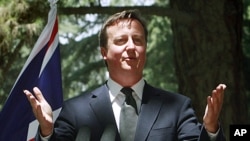Britain’s Prime Minister David Cameron made an unannounced stop in Afghanistan Tuesday. The visit comes at a time when some NATO troops and top leaders are beginning to prepare to leave the country. The NATO mission in Afghanistan says four of its service members died in two separate attacks in the east as Cameron visited, Kabul, and pledged to increase British aid to the country.
Cameron met with a collection of leaders in his stopover in Kabul, including President Hamid Karzai and the outgoing U.S. military commander, General David Petraeus.
Prime Minister Cameron repeated Britain's commitment to Afghanistan and said his country would increase aid as British troops are being withdrawn. He also announced a plan to build a military academy in Afghanistan modeled after England's Sandhurst Academy.
Along with other NATO countries that have contributed to the fighting force in Afghanistan, Britain is beginning a withdrawal of its approximately 9,500 troops in an effort to hand over control of the nation’s security by 2014.
However, unlike the United States and some other nations that say the final withdrawal date will depend on conditions on the ground, Britain looks at 2014 as a hard deadline for the withdrawal of all its combat forces.
"Because, yes, we will be drawing down some of our troops this year and next year and, yes, we will be ending combat operations by the end of 2014. We won’t have troops in anything like that number that we have now, but we will have a long-term relationship," said Cameron.
Cameron recalled that Irish Republican Army militants in Northern Ireland were trying to kill police officers and British troops in the past, but they are now part of the political process in Belfast. The British government chief said that experience could guide Afghanistan's effort to integrate Taliban insurgents into civil society.
Since the Obama administration's recent announcement of a withdrawal schedule for U.S. forces in Afghanistan, NATO coalition partners have been specifying when their troops, too, will leave.
Several members of the NATO military and civilian leadership also are preparing to hand over their duties to others. General Petraeus is due to leave shortly to become director of the U.S. Central Intelligence Agency. His second in command, General David Rodriguez, and U.S. Ambassador Karl Eikenberry are preparing to leave the country as well.
In Islamabad, a U.S. delegation met with Pakistani officials Tuesday, discussing how to keep Afghanistan stable as NATO troops leave, and also how to stem the narcotics industry there.
The U.S. State Department's top official on international narcotics and law enforcement, Assistant Secretary William Brownfield, said the meetings were about saving lives, not just in the region, but globally. He says Afghanistan’s fate contributes to that effort.
"The purpose of today’s meeting, more than any other, is - simply stated - how to save lives," said Brownfield. "Pakistani lives, Afghan lives and, quite frankly, the lives of any national from any country on this planet."
Pakistani officials say the continuing instability in Afghanistan is drifting over the border into Pakistan's tribal areas. And they point to the recent attack on the luxury Hotel Inter-Continental in Kabul as an indicator of how formidable a force the Taliban still is.




